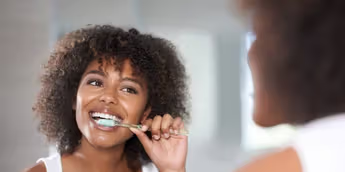Here’s why you shouldn’t rinse your mouth after brushing

Contrary to popular belief, instead of rinsing after brushing, you can skip the rinse and get to enjoy some health benefits.
Everyone brushes their teeth daily. That is the norm and the usual dental routine is brushing our teeth and an automatic reflex: rinsing our mouths with water.
While this is what most of us are used to, recent research has given some compelling reasons to reconsider this habit.
Contrary to popular belief, instead of rinsing after brushing, you can skip the rinse and get to enjoy some health benefits. This means after brushing, you spit out, rinse your toothbrush and you are done.
Why you shouldn’t rinse your mouth after brushing
Are you still wondering why you should be doing this? Here is why you may want to think twice before reaching for that glass of water after brushing.
1. Maximises the effect of fluoride in your toothpaste
Fluoride, a naturally occurring mineral, is commonly found in most toothpaste. It helps to strengthen tooth enamel, making it more resistant to decay.
Many toothpaste brands contain fluoride, and the fluoride concentration in these toothpaste is carefully formulated to provide optimal protection against cavities. However, when you rinse your mouth immediately after brushing, you wash away much of the fluoride left behind by the toothpaste, which reduces its effectiveness.
When you do not rinse, you allow the fluoride to remain in contact with your teeth for a longer period. This maximises its benefits.
2. Protect your teeth better
One of the most common causes of tooth problems is plaque – a sticky film of bacteria that forms on teeth and usually leads to tooth decay and gum disease. Toothpaste is designed not only to remove plaque, but also to leave behind a protective layer that helps prevent its reformation.
This protective layer can be disrupted when you rinse immediately after brushing, diminishing its ability to shield your teeth from harmful bacteria. But then, when you do not rinse, you enable the active ingredients in toothpaste to continue working, providing prolonged protection against plaque buildup.
3. You’re getting value for your money
Toothpaste comes at a price and we do not get it for free. To get full value for your money, it is better to not rinse after brushing, at least, the toothpaste gets to do its full job on your teeth. Besides, you get to save water while brushing.
You might be wondering, you have been rinsing after brushing all your life and your teeth seem fine. Well, your teeth might be fine but it costs nothing to add an extra layer of protection as research shows that those who do not rinse after brushing have higher fluoride content in their mouths at the end of the day.
Using mouthwash to rinse is also not a better alternative to not rinsing with water as toothpaste contains more fluoride than your everyday mouthwash, so you get more value when you do not rinse.
Not rinsing might seem weird at first, but the more you do it, the more you get used to it and get better oral health. So why not give it a try?




